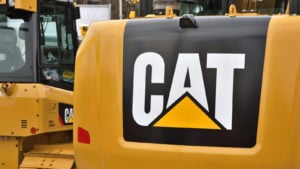Caterpillar (NYSE:CAT) reported its fourth-quarter results on Jan. 31 that showed lower revenue but 3% higher net income per share. Moreover, its cash flow remains very healthy. CAT stock remains very cheap with a forward price-to-earnings ratio below 13 and a 3.2% dividend yield.

One potential downside is the company’s outlook for 2020. Management said it expects a range of $8.50 to $10 per share. This is down significantly from its 2019 full-year earnings per share of $11.06.
The company blamed 8% lower year-over-year fourth-quarter revenues on slower inventory demand from dealers. Most of its revenue is from both the construction and energy industries.
Dealers have been skittish, given concerns about the economy and trade. Sales fell just 2% for the full year. The higher drop in Q4 probably reflects corporate cautiousness in the construction industry and lower energy prices.
Nevertheless, Caterpillar generated free cash flow in 2019 that was 11% higher than in 2018.
Higher Free Cash Flow Will Drive CAT Stock Higher
Caterpillar produced $6.9 billion in operating cash flow in 2019, up 5.1% over 2018. But to show the company’s free cash flow, we have to deduct its capital expenditures.
Capital expenditure spending was significantly lower in 2019. The company spent $1.1 billion compared to $1.3 billion. The net result is that after deducting capex spending, CAT stock produced 11% higher free cash flow of $5.8 billion.
This is very significant since it allowed the company to dramatically increase its dividend per share as well as share buybacks. These will drive the stock higher.
Expect a Higher Dividend
For example, the dividend per share for CAT stock rose to $1.03 per quarter starting last July. This was 20% higher than the previous dividend of 86 cents per share. And that prior dividend was also 10% higher.
Caterpillar has now declared three such higher dividends at the $1.03 quarterly rate. After the next dividend is declared, you can probably expect an even higher dividend rate.
I expect, for example, that the company will declare a 15% higher dividend. This is the average of the past two years’ gains. So the full-year dividend rate by May 2020 will be $4.72 per share, up from $4.12 today.
So at a dividend yield of 3%, CAT stock would be worth $157.33. That would push it up 20% from today’s price.
Why do I think the dividend will rise by 15% when free cash rose just 11%? The simple answer is share buybacks. This reduces the shares outstanding. As a result, dividends paid out are spread over a fewer number of shareholders.
For example, last year Caterpillar spent $4 billion on share repurchases, twice the $2.1 billion paid in dividends. This reduced CAT’s shares outstanding by 4.4% to 550.3 million shares.
So adding the FCF gain of 11% to the 4.4% share reduction will allow a 15% increase in dividends. This assumes a similar ratio of earnings and free cash flow for dividends.
In addition, the 15% increase in dividend per share could drive CAT stock 20% higher also due to the share buybacks.
What Should Investors Do?
It turns out that simple things like cash flow and dividends often move a stock higher despite the uncertainties in a company’s outlook. Shareholders and potential investors in CAT stock should consider this.
For example, let’s say the company hits a dramatic snag in its earnings. The dividend takes up just 36% of its free cash flow right now ($2.1 billion divided by $5.8 billion in free cash flow).
So FCF could lose up to one-third of its current value and theoretically, the company could still afford to keep its dividend per share steady. The point is that the dividend per share, once raised, tends to be sticky. This is especially true if the dividend does not take up a huge portion of earnings and cash flow.
What’s the bottom line? Investors should consider CAT stock a pretty good bargain at this price.
As of this writing, Mark Hake, CFA does not hold a position in any of the aforementioned securities. Mark Hake runs the Total Yield Value Guide which you can review here. The Guide focuses on high total yield value stocks. Subscribers receive a two-week free trial.
